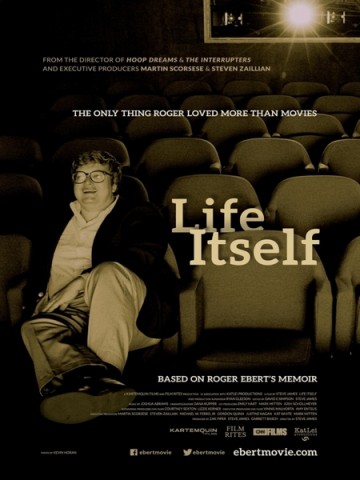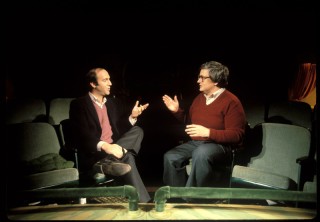 Life and death of America's most famous film critic
Life and death of America's most famous film criticOn PBS, then syndicated, the jovial, chubby, Pulitzer prize-winning Chicagoan from the more working class
Sun-Times did the "Sneak Previews" show with Yale grad Gene Siskel of the more posh
Tribune. They sparred and shouted each other down, thumbs-upped and thumbs-downed for twenty years, making informed arguing about new movies a Sunday evening after-dinner ritual. Ebert continued variations of the show with others after Siskel's death at 53 from cancer, the disease that was to fell him too at 70 14 years later. That show, plus his endless books and newspaper reviews, which went online as soon as there was an online, plus many other activities such as Cannes, Sundance, and other festivals, including his own Ebertfest, and Ebert's sheer tireless willingness to be the visible face of American film reviewing, made him the most famous film critic in America. Roger Ebert may have played much the same role for movies that Julia Child played Stateside for French cuisine.
Well, not quite. Child's TV show and cookbooks led Americans to tackle complicated dishes. Ebert merely made visible the art of talking about movies. But in so doing he awakened the wider public to the idea of cinema as art worthy of serious debate. As a popularizer he played a role some of us might wish that Pauline Kael or Jonathan Rosenbaum (Ebert's fellow Chicagoan) or any number of more sophisticated or polished writers for magazines or major papers might have played. But mainstream and Middle American Roger Ebert was, ultimately, the voice America needed. And he was never condescending, always intelligent, and while he has been accused of talking too much about big budget big studio pictures, he championed smaller ones more than many realize. This film mentions some. Roger Ebert is justly celebrated in this documentary by Steve James. This is a touching, humane and thorough portrait.
James himself, like many other filmmakers, owes something to the critic, who championed James's masterful early (1994) documentary about young black basketball players,
Hoop Dreams. That debt is both significant and incidental. What may count more is that both
Hoop Dreams and this new film show James not only is a fine director, clearly one of the best American documentarians, but a man with passion and warmth matching Ebert's.
Ebert was first and always a newspaperman, showing writing talent and journalistic bent right from childhood. He revealed unusual maturity and initiative as a reporter and editor of the
Daily Illini while a student at the University of Illinois. He joined the
Chicago Sun-Times in 1967 in his early twenties, simply falling heir by luck to the movie critic's job a few years later and never leaving it, despite later being wooed by more prestigious papers like the
Washington Post. He lived the rough, boozy newsman life, to the extent that he had to quit drinking and join A.A. in 1979, a fact he went public about, after cancer had hit him, in August 2009, on his truth-telling blog
rogerebert.com, with a piece called "My Name is Roger, and I'm an alcoholic." Maybe this newspaper formation also explains how as one talking head says, Ebert could knock out a complete movie review in half an hour. Keep that in mind. It's an act most of us had best not try to follow. Few film reviewers have that kind of facility or fecundity. His reviews read like a man talking, also like a man with decades of thinking about movies behind him. (James shows Ebert was a mesmerizing lecturer on classic films.) It is interesting to learn direct from Martin Scorsese that when he himself was a wreck from his own cocaine problem, Ebert's public support helped him to pull himself together. And we also learn that Ebert's wife and companion for the last 20 years of his life, Chaz, a black woman, whose support in the last days is one of
Life Itself's most moving chapters, he had originally met at A.A.
James's film goes to the heart of things like this, and also provides backstage views, some might say not enough, of Siskel and Ebert's testy and funny off-the-record sparring during sessions when their show was being filmed. One friend says Ebert was "nice, but not
that nice," and other comments make clear he was a showoff and a bit of a control freak, as well as an only child. This made the show with Siskel, though it made them famous, something of a torment. He didn't altogether want to share. But the occasional full-on viciousness of the two critics' on-screen head-butting was something viewers enjoyed, the constant clashes adding extra value to the times when a movie they reviewed wound up with the unanimity of "two thumbs up" or "two thumbs down."
 Gene Siskel and Roger Ebert
Gene Siskel and Roger EbertThis simplistic rating system, though perhaps required for the TV medium, was what irked serious cinephiles, and led to the famous
Film Comment attack by Richard Corless entitled "All Thumbs: Or, Is There a Future for Film Criticism?" The head-shaking was shared by
The Chicago Reader's erudite film guru Jonathan Rosenbaum. Yet if you read
Ebert's reply to Corliss, he delivered a strong defense of the show. Both Corliss and Rosenbaum have nice things to say about Ebert in this film, as does A.O. Scott, chief film critic of the
New York Times. In balance, most seem to concede that Siskel and Ebert, "all thumbs" or not, wound up educating the public, not dumbing it down.
The background images, biography and talking history in James's film are beautifully done, but what gives emotional punch to
Life Itself (which is based on Ebert's 2011 memoir of the same name) is the unexpected fact that James began working on it when, as it turned out, Ebert was in the last five months of his life. James therefore, with Ebert's full cooperation, chooses to provide a closeup of those difficult but brave final days. This any close reader of Ebert probably already knows: that as operations removed his lower jaw and he could no longer eat, drink, or speak, he continued to write, and write, and write. His blog had become not only film criticism but life itself, about his life as well as film, and also a way of holding onto life. Ebert maintains in the final scenes a remarkable determination and good cheer. There are warm images of Roger with Chaz and her family, of which he became a beloved member. In his last years of struggle with cancer Ebert became "the good soldier of cinema," as Werner Herzog put it, and Herzog, seeing Ebert's energy and spirit as that of an adventurer daring to enter into his last days not only with courage and grace but productively, dedicated his 2007 documentary about adventurers at the end of the earth in Antarctica,
Encounters at the End of the World, to Roger Ebert. A dedication from Werner Herzog, who never dedicated a film of his to anybody, is probably as fine a tribute as anyone in the world of cinema, or of courage, could ever want. But this documentary is a worthy one too.
Life Itself, 115 mins., debuted at Sundance Jan. 2014. Also showed at Cannes, Ebertfest, and other festivals. Limited US theatrical release 4 July 2014. Metacritic rating: 90%.





